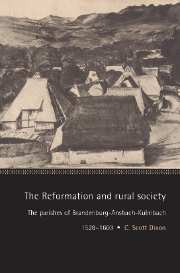Book contents
- Frontmatter
- Contents
- Preface
- Abbreviations
- Introduction
- 1 The emergence and reception of the evangelical movement 1521–1533
- 2 The Lutheran church in Brandenburg-Ansbach-Kulmbach
- 3 The clergyman in context: the extension of the Reformation to the parish
- 4 The Reformation and parish morality
- 5 The acculturation of the parish mind
- Conclusions
- Bibliography
- Index
- CAMBRIDGE STUDIES IN EARLY MODERN HISTORY
2 - The Lutheran church in Brandenburg-Ansbach-Kulmbach
Published online by Cambridge University Press: 03 October 2009
- Frontmatter
- Contents
- Preface
- Abbreviations
- Introduction
- 1 The emergence and reception of the evangelical movement 1521–1533
- 2 The Lutheran church in Brandenburg-Ansbach-Kulmbach
- 3 The clergyman in context: the extension of the Reformation to the parish
- 4 The Reformation and parish morality
- 5 The acculturation of the parish mind
- Conclusions
- Bibliography
- Index
- CAMBRIDGE STUDIES IN EARLY MODERN HISTORY
Summary
THE EVOLUTION OF THE CHURCH
The reform leaders in Brandenburg-Ansbach-Kulmbach followed Luther's line of reasoning when they justified the margrave's usurpation of ecclesiastical power. In the Franconian Confession, Luther's idea of the Two Kingdoms provided the context for a discussion of the church. The real church, the community of true believers, is invisible, ruled through Christ alone (Gewalt Christi). However, as it is necessary for the external form to maintain order, the rule of the church (Gewalt der Kirche) prescribes the service and the organisation of the assembly. The former deals with salvation, the latter with peace and unity among believers. In order to maintain peace and order on earth, the margrave laid full claim to powers of supervision over the rule of the church. (This was a bid for power rather more emphatic than Luther's early notion of ‘emergency bishops’ who were acting in a temporary and exceptional capacity.) A threefold support is offered for the margrave's claim: First, he inherits the task by default, as the bishops would not comply with the principles of reform; secondly, as protector of the public peace and possessor of high jurisdiction (Hochgerichtsbarkeit) – an office granted by God – he has an obligation to maintain accord; lastly, as a member of the Christian estate and one soul among many in the priesthood of all believers (though praecipuum membrum ecclesiae), he was obliged out of Christian love and duty to watch over his fellow man. Johann Rurer, the Ansbach clergyman, was emphatic in his support of the margrave's intervention: the sovereign powers had a divine obligation to tend for their subjects' souls.
- Type
- Chapter
- Information
- The Reformation and Rural SocietyThe Parishes of Brandenburg-Ansbach-Kulmbach, 1528–1603, pp. 47 - 65Publisher: Cambridge University PressPrint publication year: 1995



